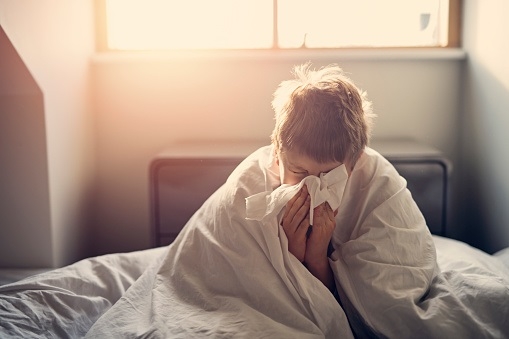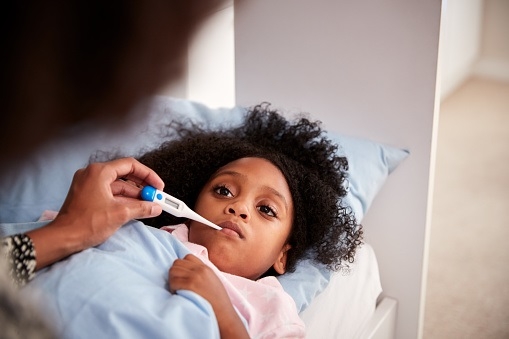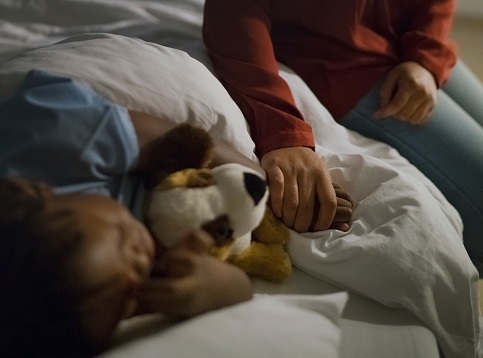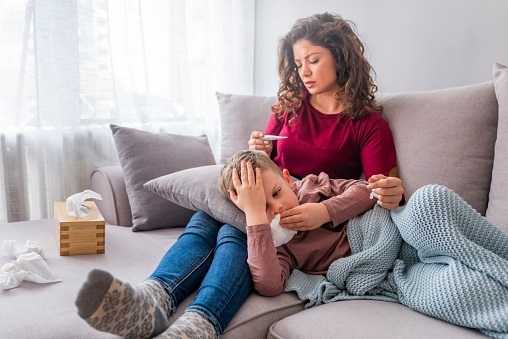Supporting Unwell Children Do's and Dont's

As we say goodbye to summer and the temperature starts to change quite dramatically, it is inevitable that our children will catch at least a cold, if not one of the other childhood illnesses as they do the rounds. An added burden for parents this year is the worry about COVID-19, especially as the number of cases in many countries are rising once again and with more cases amongst young children. Interestingly, many GPs predict that the number of cases of the usual winter illnesses could be lower than usual because everyone is washing hands regularly, using hand sanitiser often and wearing masks to prevent the spread of COVID-19. Even if your child has just a cold, they will be feeling miserable and some extra TLC will definitely help speed up their recovery…

Do keep your child’s bedroom well ventilated as this will help them to feel more comfortable.
Do give your child plenty of fluids to drink. This will help prevent dehydration and also, your child will find it much easier to drink than eat. Water (at room temperature) tastes nice with a spoonful each of lemon and honey added and this is good for colds. Fruit juice and clear soups are also good. If your child will not drink because their throat is really sore, make some fruit juice ice pops as these are very soothing to suck.
Do ensure that your child washes their hands very often, not only is this important for COVID-19, but it also important to prevent spreading the germs to other family members. Teach your child how to sneeze and cough into the crook of their arm. Use separate bowls and cutlery for your child and wash them up separately.
DO use pure saline nasal sprays or saline drops to help unblock stuffy noses as they can be used on children aged over two years and can be very comforting. It is important to only use pure saline and not products containing decongestants.
Do try and help your child’s breathing if they have a cold by using vapour rub. This should not be applied directly onto their skin but can be rubbed on the chest of your child’s pyjamas or smeared onto the cot sheet in the area where your child rests their head.
Do spend time in a warm bathroom. Even if your child does not feel like having a bath, the moist steamy air can ease their congestion.
Do call your GP if your child’s symptoms do not ease or if they get worse. Keep a record of your child’s temperature and call for advice if they have difficulty breathing or are vomiting or their fluid intake has dropped. Check the glands on their neck as these could be inflamed too. If in doubt, always seek professional advice.
Do teach your child that doctors and other health professionals are safe, caring people.
Do spend time with your child whilst they are in bed. Quiet pastimes such as jigsaws and reading books will help pass the time.

Don’t panic if your child has a high temperature – children’s temperatures can rise alarmingly quickly. If they are well enough, give them a warm bath (blood heat, so if you test it with your elbow it should feel neither hot nor cold).this should cool your child down, but don’t let them get cold in the bath. Alternatively, you can sponge them down using warm water as this is also very effective. If you cannot get their temperature down, telephone your GP for advice.
Don’t give your child a drink that will cause dehydration. These include all drinks containing caffeine such as cola, tea, coffee and some soft drinks.
Don’t let anyone around your child smoke as this can really worsen their symptoms and make their illness worse.
Don’t let your tired get overtired. Children who are sick tire very easily and it is good if they can sleep as this is the best way for them to get better.
Don’t take your child out and about if they are not feeling well as a number of childhood illnesses are contagious for days before they are diagnosed. For example:
- Chickenpox has an incubation period of 14-21 days and your child is most contagious 48 hours before the first spots appear and until the last spot has crusted over.- Measles has an incubation period of 7-14 days, but your child is contagious four days before the spots appear and until all the spots have gone.
- Rubella (German Measles) has an incubation period of 14- 21 days and your child will be infectious for seven days before the rash and for five days after the rash has appeared.
- Bronchitis has an incubation period of 4-6 days and is infectious from the start of the cough and for seven days afterwards.
- Influenza has an incubation period of 1-2 days and is infectious from the start until the fever has gone.

Chrissie x

